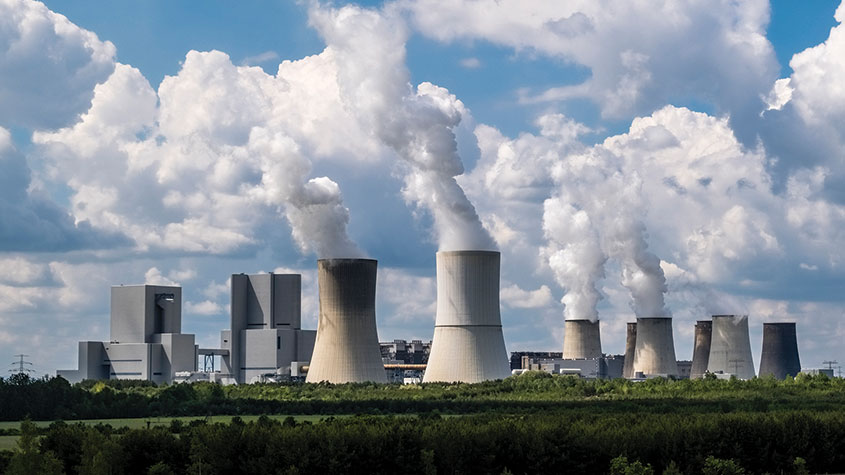Eurozone economy heads for paralysis
Record high energy prices, the threat of recession in Germany and squabbling in Italy's government has left the eurozone fighting fires on all fronts.

Get the latest financial news, insights and expert analysis from our award-winning MoneyWeek team, to help you understand what really matters when it comes to your finances.
You are now subscribed
Your newsletter sign-up was successful
Want to add more newsletters?

Twice daily
MoneyWeek
Get the latest financial news, insights and expert analysis from our award-winning MoneyWeek team, to help you understand what really matters when it comes to your finances.

Four times a week
Look After My Bills
Sign up to our free money-saving newsletter, filled with the latest news and expert advice to help you find the best tips and deals for managing your bills. Start saving today!
The eurozone is fighting “fires on all fronts”, says Mehreen Khan in The Times. Squabbling in Italy’s governing coalition has left the bloc’s third-biggest economy heading for “a summer of political paralysis”, with the future of prime minister Mario Draghi in doubt.
Between record energy prices, the threat of Russian gas being switched off and the prospect of recession in Germany, policymakers in Brussels and Frankfurt already had enough to deal with.
European governments have begun to work under the assumption that Russian energy will be cut off entirely this year, say Ewa Krukowska and John Ainger on Bloomberg. The European Commission is reportedly preparing a plan for “a voluntary 15% cut in natural gas use by member states starting next month” to conserve stocks for winter. The Commission thinks a Russian gas cut-off and a harsh winter could wipe 1.5% off EU GDP.
MoneyWeek
Subscribe to MoneyWeek today and get your first six magazine issues absolutely FREE

Sign up to Money Morning
Don't miss the latest investment and personal finances news, market analysis, plus money-saving tips with our free twice-daily newsletter
Don't miss the latest investment and personal finances news, market analysis, plus money-saving tips with our free twice-daily newsletter
Germany has reduced its dependence on Russian gas from 55% to 35% since the invasion of Ukraine, says Philip Oltermann in The Guardian, but that still leaves it heavily exposed to Putin’s whims. For now, politicians hope to spare households from rationing while imposing restrictions on industry, which accounts for roughly one-third of gas use. Yet the chemical and pharmaceutical industries are warning of unintended “domino effects” from more supply-chain disruption.
“The good news is that the EU’s tanks are now almost 60% full”, more than this time last year, Leslie Palti-Guzman of data firm Leviaton told The Economist. Europe has also become a major importer of liquefied natural gas (LNG), with imports up 70% year on year in the first quarter. “To the chagrin of greens” European governments are also granting waivers for “filthy coal” plants to “crank out more power”.
Get the latest financial news, insights and expert analysis from our award-winning MoneyWeek team, to help you understand what really matters when it comes to your finances.
Alex is an investment writer who has been contributing to MoneyWeek since 2015. He has been the magazine’s markets editor since 2019.
Alex has a passion for demystifying the often arcane world of finance for a general readership. While financial media tends to focus compulsively on the latest trend, the best opportunities can lie forgotten elsewhere.
He is especially interested in European equities – where his fluent French helps him to cover the continent’s largest bourse – and emerging markets, where his experience living in Beijing, and conversational Chinese, prove useful.
Hailing from Leeds, he studied Philosophy, Politics and Economics at the University of Oxford. He also holds a Master of Public Health from the University of Manchester.
-
 Early signs of the AI apocalypse?
Early signs of the AI apocalypse?Uncertainty is rife as investors question what the impact of AI will be.
-
 Reach for the stars to boost Britain's space industry
Reach for the stars to boost Britain's space industryopinion We can’t afford to neglect Britain's space industry. Unfortunately, the government is taking completely the wrong approach, says Matthew Lynn
-
 No peace dividend in Trump's Ukraine plan
No peace dividend in Trump's Ukraine planOpinion An end to fighting in Ukraine will hurt defence shares in the short term, but the boom is likely to continue given US isolationism, says Matthew Lynn
-
 Investors need to get ready for an age of uncertainty and upheaval
Investors need to get ready for an age of uncertainty and upheavalTectonic geopolitical and economic shifts are underway. Investors need to consider a range of tools when positioning portfolios to accommodate these changes
-
 Europe’s new single stock market is no panacea
Europe’s new single stock market is no panaceaOpinion It is hard to see how a single European stock exchange will fix anything. Friedrich Merz is trying his hand at a failed strategy, says Matthew Lynn
-
 Ukraine invades Russia – what are the political implications?
Ukraine invades Russia – what are the political implications?Ukraine's surprise invasion into Kursk could change the course of the war politically
-
 UK wages grow at a record pace
UK wages grow at a record paceThe latest UK wages data will add pressure on the BoE to push interest rates even higher.
-
 Trapped in a time of zombie government
Trapped in a time of zombie governmentIt’s not just companies that are eking out an existence, says Max King. The state is in the twilight zone too.
-
 America is in deep denial over debt
America is in deep denial over debtThe downgrade in America’s credit rating was much criticised by the US government, says Alex Rankine. But was it a long time coming?
-
 UK economy avoids stagnation with surprise growth
UK economy avoids stagnation with surprise growthGross domestic product increased by 0.2% in the second quarter and by 0.5% in June